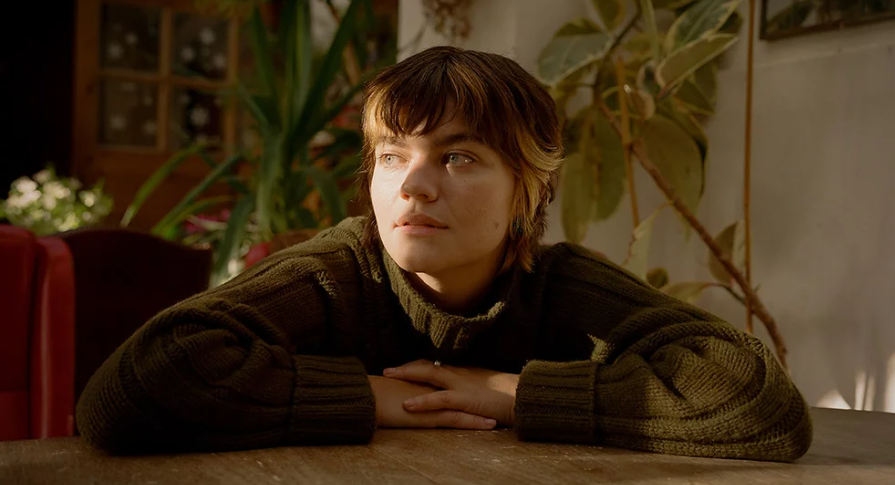
“Every man has the f***ing his mother dream at some point”: a review of Robert Icke’s Oedipus

Oedipus’ mother Merope warns that “Knowledge in advance is the gift of the gods.” In that case we must all be somewhat divine, because we know how the story of Oedipus will unfold. The big spoiler has been knocking around since the fifth century BCE. It has even evolved into our language of self-understanding via Freud’s infamous Oedipus Complex, which claims that we all must symbolically kill our father and have sex with our mother on our path to sexual maturity. Nonetheless, the entire theatre holds its breath as Oedipus realises that he has unwittingly murdered his father and slept with his mother Jocasta. Robert Icke’s adaptation of Oedipus feels like a breath of fresh air, and perfectly retains its power to shock.
Icke has situated Sophocles’ play in a twenty-first-century context. Mark Strong plays Oedipus, a media-savvy but honest politician on the cusp of his election victory. In a pre-recorded campaign video that greets us before the play starts, he states confidently “I’ll see you all in about two hours,” to rapturous applause. True enough, the curtains open on an office where an electric clock counts down the play’s duration in blood-red digits. There is no interval, no pause to catch your breath and collect your thoughts: the events of the play must hurtle inevitably forward. In just two hours, we watch a man’s life crumble, piece by piece, before his very eyes, until he can no longer bear to see it.
The staging is genius. Despite his modern retelling, Icke has rightly not done away with the classical unities (of time, place, and action). But the story has a decidedly contemporary flavour. The political context fits today’s fast-paced, febrile environment, and the circumstances of Oedipus’ life have tongue-in-cheek contemporary parallels: Oedipus is married to a woman old enough to be his mother, just like France’s President Emmanuel Macron, and Oedipus’ promise to reveal his birth certificate smacks of Donald Trump’s ridiculous challenge to Barack Obama.
Strong is excellent as Oedipus the politician, dynamic and steely-jawed in a sharp suit. But Strong’s Oedipus is also a family man, and a #Woke one at that: he sermonises about the joys of sex and gay love at the dinner table, while his elderly mother Merope (tonight played by Celia Nelson as understudy for June Watson) scowls uncomfortably. But it is Lesley Manville, as Oedipus’ wife Jocasta, who really steals the show. Manville fizzes with blue-blooded, good-humoured froideur: “As soon as you can visit the polls, my job as mother is done,” she tells her rebellious daughter Antigone (Phia Saban). Strong and Manville have impeccable sexual chemistry. “Every man has the fucking his mother dream at some point,” Manville’s Jocasta teases, to a few faint, hesitant titters from the audience, before her and Strong mope offstage for a quickie.
In fact, the language of sexuality – of love, lust, and dirty secrets – soaks through the fabric of the entire play, even in scenes where this is not immediately obvious. One such instance is when Jocasta’s canny brother Creon (Michael Gould) warns that Oedipus’ “honesty fetish,” his quest to know everything about himself, is going to undermine his entire political campaign and ultimately prove his undoing.
Icke’s play has been criticised for its pace, with The Telegraph arguing that when its climax finally arrives, it is “too little, too late”. I completely disagree. The convivial family atmosphere of the play’s start is necessary to lend poignancy to the images that follow: a vast red blood stain on Hildegard Bechtler’s otherwise minimalistic set, a sharp stiletto heel pointed towards an eyeball. And all the time, the timer counts ominously, claustrophobically backwards, as the seconds count down to the revelatory moment.
Most of us know the spoiler, but it is nonetheless a nail-biting moment, acted to perfection by both Manville and Strong. The scene of them attempting to have sex one more time after the revelation, then peeling themselves away from each other as they choke with sobs, is challenging to watch. When the play ends, there is a genuine sense of catharsis that pulses through the theatre.
The coincidences on which the play hinges may seem too far-fetched for a contemporary audience that no longer believes in divine punishments doled out by the gods. But the story of Oedipus also represents the risk of truly knowing yourself. “People are good at not knowing; the instinct to look in any direction other than the dark,” Manville’s Jocasta muses, in a heart-wrenching scene. Perhaps this is our self-preservation. But our compulsive fascination with the figure of Oedipus, the man who set out to uncover truths, continues: at the start of 2025, another version of Oedipus is coming to the Old Vic, starring Rami Malek and Indira Varma. Robert Icke’s adaptation will be an extremely tough act to follow. It is theatre at its finest – emotionally complex, perfectly unified, brilliantly acted.
When the play ends, the lights come on, the claps ring out, but the actors have shadows hanging over their faces. Manville wipes away tears as the cast bows, and I do not doubt for a second what a difficult mental place she and Strong must visit every single night for our enjoyment. As I head out into the London twilight, I take away with me this final image – the true cost of knowing yourself inside out, even as a character.
Oedipus is showing at Wyndham’s Theatre, London, until 4 January 2025. Running time 2 hours.∎
Words by by Irina Husti-Radulet. Image Courtesy of Osama Shukir Muhammed Amin via Wikimedia Commons.







